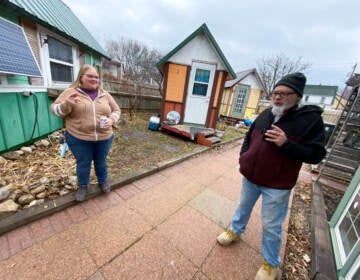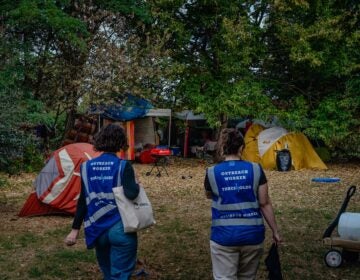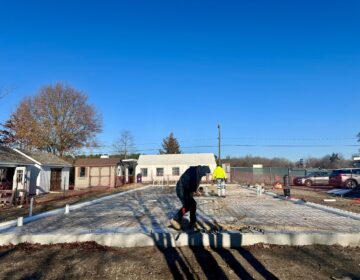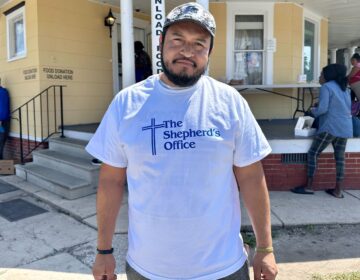Southern Delaware pallet village offers help for growing number of people experiencing homelessness
As part of an effort to reduce the number of people in Delaware experiencing homelessness, the first pallet villages will soon be constructed in southern Delaware.
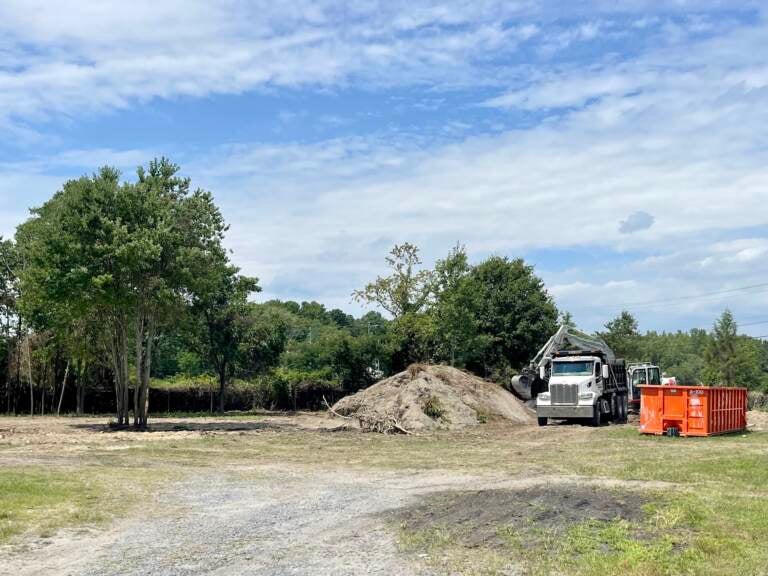
The construction site for the Pallet Village in Georgetown, Delaware. (Johnny Perez-Gonzalez/WHYY)
The number of people experiencing homelessness in Delaware has seen a massive surge since the start of the pandemic. The latest point-in-time survey by the Delaware Continuum of Care found 2,369 people experiencing homelessness in the state, the highest count ever and more than double the number from the January 2020 survey.
In an effort to reduce those numbers, the first pallet villages will soon be constructed in southern Delaware. Organizers hope the tiny homes being built in Sussex County will offer shelter to those in need.
The pallet village will be made up of 40 64-square-foot cabins that will only be used for sleeping. Air conditioning, heat, and electrical outlets will be provided in all cabins. The space between the units will be roughly 8 feet, which is the minimum allowed by the fire marshal. There will be broader walkways so that people can go back and forth to their units. The area will also include four common bathrooms, one of which will be ADA accessible.
A community center will also be built in the village, with three community engagement specialists working with all 40 program participants to aid them with their basic needs including mental or physical health, addiction, job training, and so on.
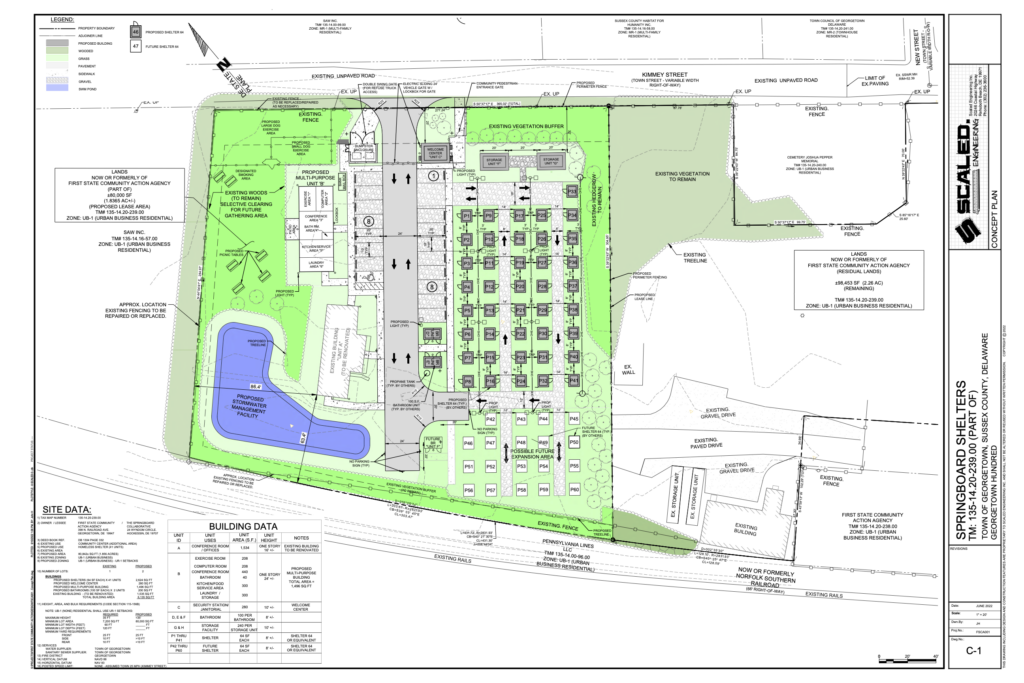
Springboard Collaborative, in partnership with the First State Community Action Agency, hopes to eventually expand the pallet village idea statewide.
The collaborative was established in September 2020 by executive director Judson Malone and co-founders Chris Hannah Ronald and Jeff Ronald.
Malone said the group has raised around “2 million now to implement a project back here to provide individual sleeping cabins for 40 homeless men and women.” They’ve also recently successfully obtained their 501(c)(3) certification as a nonprofit organization.
Springboard is specifically focused on the people without a permanent place to stay in the Sussex County seat. “We have a crisis of homelessness in Georgetown,” Malone said. “The town recognized it last year. We started meeting many months ago.”
Delaware has seen an increase in need amid the pandemic, with the number of people getting help from food banks and state assistance growing. The Delaware State Housing Authority has also seen an uptick in people looking for housing assistance as the state deals with a shortage of affordable housing.
The lack of affordable housing is contributing to the growing number of people experiencing homelessness. Not only is this evident in Georgetown, but it’s also seen in several homeless encampments throughout Sussex County, including those in Milford, Seaford, Rehoboth, and Lewes.
Outside of Lewes, near the Conley’s United Methodist Church, Springboard was considering building a pallet village. Those plans were stymied by issues with zoning permission and conflicts with people of the surrounding community who are opposed.
Malone said some local residents fought the plans, making comments like “‘We don’t want anything to do with them,’ ‘don’t build it here.’” He said others were either silently supportive or sympathetic, but didn’t want it built in their own backyards.
The Behavioral Consortium’s Sandy Gibney is a physician who works in the emergency department and does outreach work to help those experiencing homelessness. She said those stereotypes don’t match up with reality.
Often, people living in homeless encampments will shift their locations to avoid drawing too much attention, she said. She adds they are clever and ingenious and take pride in their tents.
Gibney has helped administer vaccines and provide other medical services to those who might have wounds. She’s s responded to overdoses and helped people with elevated blood sugar from diabetes, hypertension, and other conditions.
After conducting studies and research, Malone and Gibney agreed that providing daily meals and ensuring that individuals have access to showers and private bathrooms have helped the homeless population to thrive.
“What we’ve heard over and over at the other villages, is that by itself is the most transformative thing that happens the quickest,” Malone says. He said providing a place with a bed, running water, showers, and a bathroom can be a huge weight lifted off their shoulders.
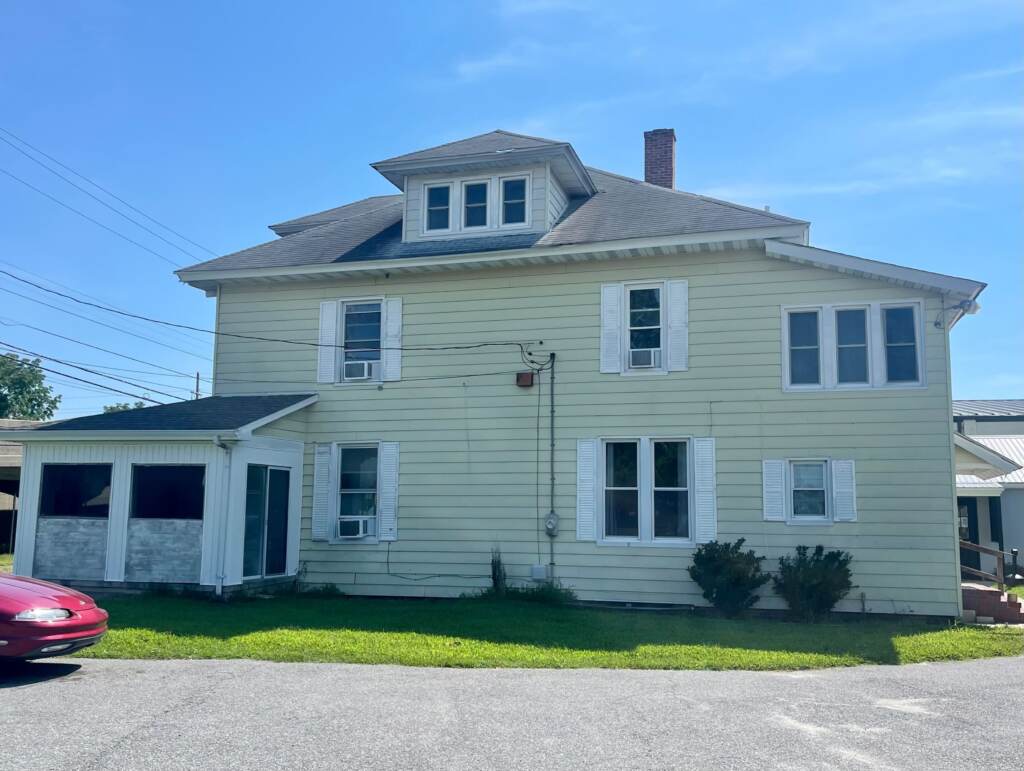
Redemption City, an operational shelter, is one of the most recent nonprofits created to help those experiencing homelessness. It launched in June, offering support to those in need with getting birth certificates, employment, social security applications, connecting them to the appropriate people, and more.
Redemption City founder and president Nikki Gonzalez says the organization now offers 10 beds, but their ultimate goal is to have 50. She said it’s a big need in Sussex amid the lack of affordable housing.
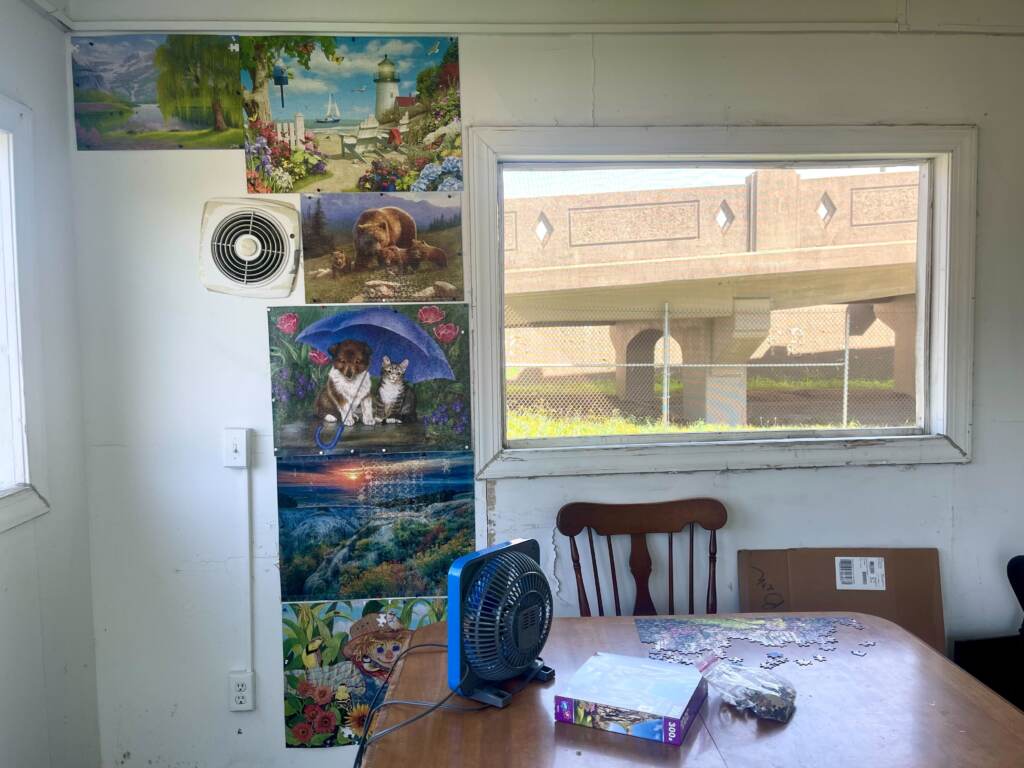
“Everything is astronomical.” Gonzalez said. “All the low-income housing is full, even the senior low-income housing that I wanted to apply for one of my 70-year-olds. He didn’t make enough to get into low-income housing, that doesn’t even make sense.”
The First State Community Action Agency is leasing their property for the development while the project is under construction. FSCAA will also aid with case management, jobs, training, supporting those who had been jailed in the past, and various poverty programs.
This year’s Springboard Collaborative team plans to start operations in October. Additionally, they plan to begin their next initiative, which will be to make tiny house communities that would be affordable for those with extremely low incomes who are just rising from homelessness.
WHYY is your source for fact-based, in-depth journalism and information. As a nonprofit organization, we rely on financial support from readers like you. Please give today.



